|
 Secure Site
Secure Site
|
 |
Archive for the 'Sleep Habits' Category
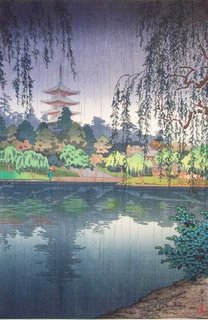 Kofukuji Temple, Nara Yokoi Outdoor rooms, porches, and pavilions let you come home again to the natural world. Let nature’s elements be your palette and sensory delight your touchstone.
Imagine waking up on a summer morning to a gentle breeze on your face, the chattering of birds, and the scent of flowers opening their petals to the dawn. You lie there, warm under your wool comforter, recalling the bliss of falling asleep with frogs croaking in the nearby pond as you gazed at the stars before closing your eyes. All this, yet indoor plumbing is only a few yards away. This is the joy of outdoor living spaces.
Outdoor rooms, porches, and pavilions are back in style. Tired of being cooped up, people are moving their dining, socializing, sleeping, and sometimes even work spaces outdoors. The success of these spaces depends a lot on understanding some basics about climate and design. If you want your investment in outdoor living to pay off, you’ll want a place that’s comfortable in a range of weather conditions.
Our ancestors, who lived without central heating and cooling, knew a lot about building sleeping porches, gazebos, and summer kitchens. These structures allowed them to escape their hot, stuffy houses in summer. After decades of burning fossil fuels with wild abandon to keep us warm in winter and cool in summer, we’re beginning to realize that these people were on to something. Well-designed outdoor rooms are the epitome of ecological design; they get their heat and light from the sun and their cooling from shade and breezes.
In fact, creating an outdoor space for your home is a great way to increase your grasp of climate-responsive design. It’s an exercise in paying attention to the ecosystems you participate in. By noticing where the prevailing winds come from, and by being aware of the sun’s path across the sky, you can create a garden room that keeps you dry in the rain, unruffled by the wind, cool in summer, and warm in all but the worst of winter without burning a drop of fuel.
Outdoor structures can also expand your home’s living space for much less expense than adding a normal room. And an attached outdoor room can increase your home’s energy efficiency by protecting it from heat, cold, and wind, or even—in the case of a sunspace—by collecting solar heat to be used indoors.
But that’s only the beginning. Outdoor living is also good for your health and well-being. Sunlight, fresh air, and greenery nourish body and soul. The sounds of birds by day and crickets by night, the scent of flowers, the feeling of warm sun and cool breezes on our skin, and the sight of birds, butterflies, and bees nourish our senses and restore our participation in the web of life.
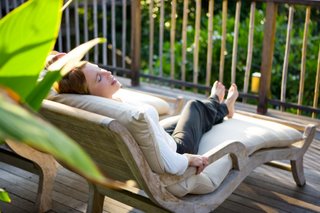 mother nature's living spaces Try this at home
If you have even a little bit of outdoor space around your home, you can enjoy these delights, too. Start by sitting in different parts of your yard. Notice which areas are sunny, shady, calm, windy, private, exposed, moist, or dry. Notice which spots have nice views, near or far. Think about access: Do you want to walk easily from your indoor kitchen to an outdoor dining room? From a sleeping porch to the bathroom?
When you select a place for an outdoor room, pay attention to how the natural elements interact with this spot, how they vary with the time of day and season, and which elements you’d like to temper for your comfort. Let’s say you want to build a pavilion in a corner of your backyard, but the prevailing wind comes from the northwest—which is exactly the direction of your favorite view. A glass wall on the northwest side will meet both your needs. Or maybe you want to create a warm spot for chilly evenings. You can build a curved stone wall that defines the space, blocks the breeze, and faces south to soak up the sun; build a stone bench against the wall, and you’ll have a toasty spot for relaxing at the day’s end. Overhead shade will make the same spot comfortably cool in summer.
Finally, consider having flexible elements that extend the usefulness of your outdoor space. Add removable glass to a screened porch to turn it into a sunroom in winter. Use heavy curtains in your pavilion to block breezes, rain, or prying eyes. Hang a seasonal cloth roof over a patio, or grow a deciduous vine on a trellis or arbor.
adapted from Natural Home Magazine, July/August 2004
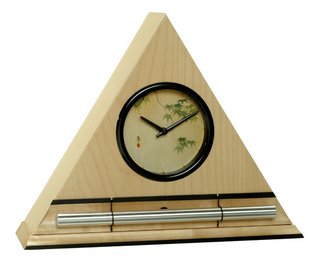 Japanese Maple Leaves Dial Face, Zen Wake-up Alarm Clock Now & Zen
1638 Pearl Street
Boulder, CO 80302
(800) 779-6383
Posted in Cherry Blossoms, Chime Alarm Clocks, Japanese Inspired Zen Clocks, Natural Awakening, Now & Zen Alarm Clocks, sleep, Sleep Habits, Ukiyo-e, wake up alarm clock
 exhaustion cures - setting your Zen Alarm Clock Are you feeling stressed, fatigued, and burned out? Discover the top 10 ways to put a stopper in your personal energy drains
Consider this simple question: How are you?
We answer it 10 times a day, often rejoining with a clipped “Fine” or “Busy!” accompanied by a glazed smile. But when your best friend or spouse asks, perhaps you tell the deeper truth: You’re stressed out and tired. Really tired.
“Busy,” “stressed,” and “tired” are intimately connected. They describe the ethos of our times — and its inevitable aftermath. We balance work, family, friends, and our various self-improvement programs. We take in a steady stream of information from the people, screens, phones, and sounds that surround us. We don’t sleep enough. We multitask like crazy, striving to get more done in less time.
For a while, maybe even years, it’s easy to feel like you can handle this frantic pace — or even thrive at it. But ultimately, it works against you. “Stress is pervasive in our society, and it’s only getting worse,” says integrative-medicine expert Woodson Merrell, M.D., author of “The Source: Unleash Your Natural Energy, Power Up Your Health, and Feel 10 Years Younger.” “And people do not necessarily have the coping skills to deal with it, even when they think they do.” We often don’t realize how much of our days are spent dealing with stressful situations, and on a physiological level, the effects of stress add up. “You don’t start every day with a clean slate,” he says. “You start the day with all the stress you’ve accumulated in your life, and you add to that.”
No wonder we’re so tired. In fact, many experts contend that chronic stress and our inability to cope with it are the biggest factors in fatigue. “I hear it all the time. People tell me, ‘I have no energy, I can’t sleep, I’m exhausted,'” says Andrew Weil, M.D., director of the Arizona Center for Integrative Medicine at the University of Arizona and author of “Healthy Aging.”
This “tired-wired” state has become a cultural condition, he adds. And for those that struggle with it, fatigue can also become a significant crisis. “Your personal energy level should meet the demands of the day. Your sense of well-being should be good most of the time,” says Weil. “When it’s not, you have a real quality-of-life shortage.”
As is always the case, however, in crisis lies opportunity. Fatigue, it turns out, can be a terrific teacher, giving you a chance to slow down and examine your life, learn more about yourself, and consider what’s really important.
For starters, you want to cover your bases by eating a healthy diet, getting regular exercise, maintaining good sleep habits, and following other steps toward sound overall energy hygiene. But many of our most potent energy drains fly under the radar. By taking careful stock of your daily habits, work life, and relationships, you can begin to see patterns that cause your vitality to slip away unnoticed; make some simple changes, and you’ll plug these leaks and start feeling better. Choosing a gentle, chiming Alarm Clock to awaken you in the morning could be step 1.
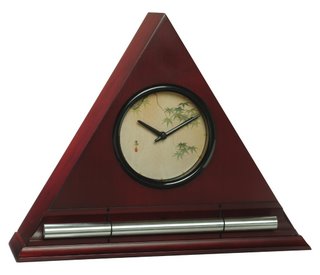 Japanese Leaves Dial Face in Burgundy Finish by Now & Zen Here, Merrell, Weil, and other experts highlight 10 surprising causes of fatigue and offer thought-provoking solutions to help you energize your mind, body, and spirit — and your life.
1. Exhaustion Cause: Good News
We know that our energy gets drained by negative events: death of a spouse, divorce, imprisonment, getting fired, serious illness or injury, losing your home or savings. But positive events can drain us, too, says Alice Domar, Ph.D., executive director of the Domar Center for Mind/Body Health in Waltham, Massachusetts. “Getting married, having a baby, buying a new house, getting promoted at work — these are all positive steps, but they often come with a lot of worry, which can be exhausting.”
To further complicate the picture, it’s hard to find support when things are going great. “Tell people you’re exhausted because you’re caring for your dying mother, and you’ll get all the support in the world,” Domar says. “Tell them you’re exhausted because you got a fantastic new job, and they’ll be like, ‘Give me a break!’ ”
Exhaustion Cure: Make a Positive Prep Plan
The best way to end-run positive exhaustion? Prepare for it. “When you start getting tired,” says Domar, “ask yourself two questions: ‘What’s being asked of me that I don’t feel that I can deliver?’ and ‘Am I accurately perceiving what’s needed?'” Then make a list of what really needs to be done, and when. “We often feel like everything needs to happen at once, and that’s not true,” says Domar. Breaking things down into manageable chunks lets you catch your breath so you can plan and delegate accordingly.
adapted from Body + Soul, September 2009
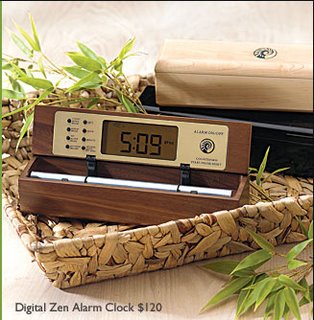 Digital Zen Alarm Clocks, available in maple, walnut, bamboo, and black lacquer
Now & Zen
1638 Pearl Street
Boulder, CO 80302
(800) 779-6383
Posted in Bamboo Chime Clocks, Chime Alarm Clocks, Japanese Inspired Zen Clocks, Natural Awakening, Now & Zen Alarm Clocks, Sleep Habits
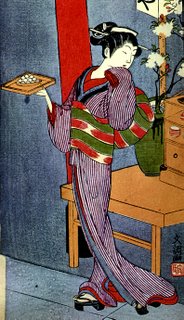 Kasamori Osen Ippitsusai Buncho SleepwalkingWhat causes it?
Sleepwalking is most common in children, who usually grow out of it. It’s a psychological issue, and when it continues into adulthood there’s typically two factors involved. “There tends to be some sort of hereditary component – it runs in families to some extent. And for people who are more susceptible to sleepwalking, times of stress bring it on,” says Professor Jim Horne, Director of the Sleep Research Centre at Loughborough University.
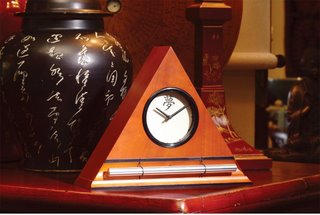 Zen Alarm Clock How to beat it
When sleepwalking, nobody talks – they just babble incoherently. But in order to stifle your somnambulism, a long chat is the best medicine. “Try to get at the underlying cause,” says Horne. “It’s a simple case of talking to someone close to you about what’s on your mind. Just be matter-of-fact about it and take it from there.” Still find yourself stalking the corridors by night? A ccording to a study in the Annals of Neurology, sleep deprivation significantly increases the number of sleepwalking episodes experienced by predisposed individuals. Staying up past midnight stopped being cool long ago. Get your eight hours in.
adapted from Men’s Health, Ed Vanstone
Posted in Chime Alarm Clocks, Japanese Inspired Zen Clocks, Meditation Timers, Natural Awakening, Now & Zen Alarm Clocks, Sleep Habits
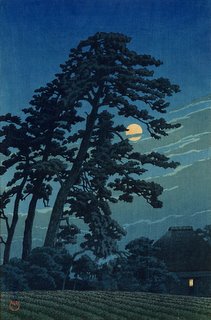 moonviewing, sweet slumber We spend up to a third of our lives asleep. Although some hard-driving people may view sleep as an inconvenience that curtails productivity and leisure activities, slumber is certainly no waste of time. In fact, sleep may play a more crucial role than diet or exercise in fostering optimal health.
A natural restorative, sleep offers an antidote to the damage done to our bodies during the day. It allows the body to replenish its immune system, eliminate free radicals, and ward off heart disease and mood imbalances. When sleep is disrupted—whether by lifestyle factors, insomnia, sleep apnea, narcolepsy, restless legs syndrome, jet lag, sleepwalking, night terrors, imbalance of hormones, or some other disorder—emotional and physiological health suffers. But you don’t have to accept sleep deprivation and the ills that accompany it. One way to gently snooze your way back to health is to focus on balancing your hormones.
Balance your hormones
The word hormone comes from the Greek hormon, meaning “to stir up.” Hormones are released by the various endocrine glands in the body in order to regulate energy production, growth, sexual development, stress responses, and many other functions. Because minute quantities of hormones can “stir up” so many activities in the body, when they are thrown out of balance the results can affect the entire body. Imbalances of Hormones often manifest as insomnia and other sleep problems. Key factors that can upset hormone levels include thyroid dysfunctions, perimenopause and menopause (in fact, disturbed sleep is one of the complaints that cause women to seek treatment for menopause and perimenopause), and andropause (the male form of menopause). Although hormone levels generally decline as a result of aging, they can also be affected by dietary choices, mineral deficiencies, environmental toxins and synthetic chemicals, medications, smoking, and stress.
Rather than artificially manipulating your estrogen levels with synthetic hormones and ignoring the reasons behind any imbalances of hormones, it is more valuable to determine why you have imbalances of hormones in the first place. Depending on the reason, restoring hormonal balance may be more effectively achieved with dietary changes, nutritional supplements, natural progesterone cream, herbal therapy, or traditional Chinese medicine tailored to the specific factors causing the imbalance of hormones.
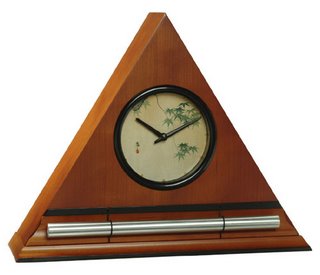 Zen Clock with Chime for a progressive awakening to sweet a slumber Now & Zen
1638 Pearl Street
Boulder, CO 80302
Excerpted from Alternative Medicine magazine’s Definitive Guide to Sleep Disorders: 7 Smart Ways to Help You Get a Good Night’s Rest (Celestial Arts, 2007)
Posted in Bamboo Chime Clocks, Chime Alarm Clocks, Japanese Inspired Zen Clocks, mindfulness practice, Natural Awakening, Now & Zen Alarm Clocks, Sleep Habits
 Zeus, disguised as a swan seduces Leda, the Queen of Sparta. A sixteenth century copy of the lost original by Michelangelo. The ancient Greeks envisioned sleep as the minor god Hypnos, born of night, who lived on the island of Lemnos in a dark cave. Lethe, the river of forgetfulness, flowed through this underworld where Hypnos lay on pillows surrounded by his many sons, including Morpheus, the dream bringer.
Unlike his twin brother Thanatos, the god of death, Hypnos was considered a friend of mortals, a healer of body and mind. He took different forms as he wandered the earth—a bird or a child, but most often a benevolent warrior carrying a horn, from which he would drip a sleep elixir. The Greeks apparently took his gifts for granted. No cults arose to worship sleep, which seems odd, for surely there were ancient insomniacs.
adapted from Utne, January/February 1999 by Bill Hayes, from Speak
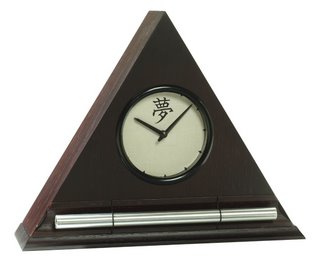 Dream Kanji Zen Alarm Clock with Chime in Dark Oak Finish, an alarm clock for insomniacs Now & Zen
1638 Pearl Street
Boulder, CO 80302
Posted in Natural Awakening, Now & Zen Alarm Clocks, Sleep Habits
« Previous Page
Next Entries »
|
|
|
|